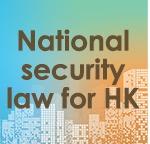HONG KONG - Hong Kong's Department of Justice (DoJ) on Saturday said the so-called "sanctions" imposed by some countries are known as "unilateral coercive measures" and are contrary to international law and the UN framework.
The department's statement came after the US administration issued a so-called "advisory" to US businesses and individuals operating in Hong Kong, and imposed "sanctions" on seven deputy directors of the Central People's Government Liaison Office in the HKSAR.
Here is the full text of the DoJ's statement:
The National Security Law (NSL) is in line with the international practice of safeguarding national security. It is appalling to see that a number of western countries have launched groundless attacks on the NSL with a deliberate attempt to mislead the international community.
The NSL clearly stipulates that the Hong Kong Special Administrative Region (HKSAR) shall protect the rights and freedoms enjoyed by residents under the Basic Law and the provisions of the International Covenant on Civil and Political Rights (ICCPR) and the International Covenant on Economic, Social and Cultural Rights as applied to Hong Kong in accordance with the law. However, such rights and freedoms are not absolute. It must be borne in mind that the ICCPR expressly states that they may be subject to restrictions as prescribed by law if it is necessary in the interests of national security, public safety, public order or the rights and freedoms of others, etc.
In handling cases of endangering national security, DoJ's prosecutors must act in accordance with the NSL and local law. All prosecutorial decisions are based on admissible evidence and applicable laws. Cases will never be handled any differently owing to the political beliefs or background of the persons involved. Prosecutions would only be commenced if there is sufficient admissible evidence to support a reasonable prospect of conviction. The DoJ has been carrying out this constitutional duty in a professional and fair manner.
Under the principles of State sovereignty and non-intervention, sanctions should be brought only in very limited circumstances, such as dealing with terrorism or nuclear proliferation, and in an appropriate forum, which is the UN Security Council. Other so-called "sanctions", known as unilateral coercive measures, are contrary to international law and the UN framework, and most importantly violate the principle of non-intervention under international law
Extraterritorial application vested with the NSL is in line with the well-recognized international law principle of "protective jurisdiction". If foreigners commit crimes abroad against a sovereign State that endanger its security or its vital interests, the sovereign State can adopt laws with extraterritorial effects to exercise prescriptive criminal jurisdiction. Extraterritoriality is in fact a common feature of national security laws in many countries. For instance, the United States Code, the Logan Act of the United States, the Terrorism (Suppression of bombings) Act of Singapore, the German Criminal Code, etc. Undoubtedly, the extraterritorial effect provided for in the NSL aligns with the principles of international law and international practice.
In the HKSAR, the only criteria upon which judges are appointed is their judicial and professional quality, and their appointment by the Chief Executive is upon the recommendation of an independent statutory commission. When adjudicating cases under the NSL, judges remain independent and impartial in performing their judicial duties, free from any interference. The arrangement on the designation of judges under the NSL does not undermine the highly respected judicial independence of the HKSAR. The HKSAR has been entrusted with the responsibility under the NSL to exercise jurisdiction over most of the cases, save for only three specified situations.
Sovereign equality is a basic norm of international relations and a fundamental principle of international law, with the Charter of the United Nations (UN) expressly setting out this principle. The principle of non-intervention is an important concept central to sovereign equality. Further, the International Court of Justice in its judgment in 1986 reiterated non-intervention as a principle of customary international law.
Under the principles of State sovereignty and non-intervention, sanctions should be brought only in very limited circumstances, such as dealing with terrorism or nuclear proliferation, and in an appropriate forum, which is the UN Security Council. Other so-called "sanctions", known as unilateral coercive measures, are contrary to international law and the UN framework, and most importantly violate the principle of non-intervention under international law.
Unilateral coercive measures are at odds with the international law principle of non-intervention, unbecoming of any civilized nation, and is a hindrance to international peace and stability. In the face of international illegal acts, countries are justified in deploying countermeasures as a response to a breach of the principle of non-intervention against itself. Therefore, the countermeasures adopted by the Central People's Government are legitimate and an accepted practice under international law.
The enactment of the NSL is in line with the international practice of safeguarding national security and the sovereign rights of our country. Hong Kong's legal system and rule of law remain robust with law and order restored. Hong Kong's financial market continues to grow after 2019. This evidences the benefits and importance of the NSL to the stability and prosperity of Hong Kong.



